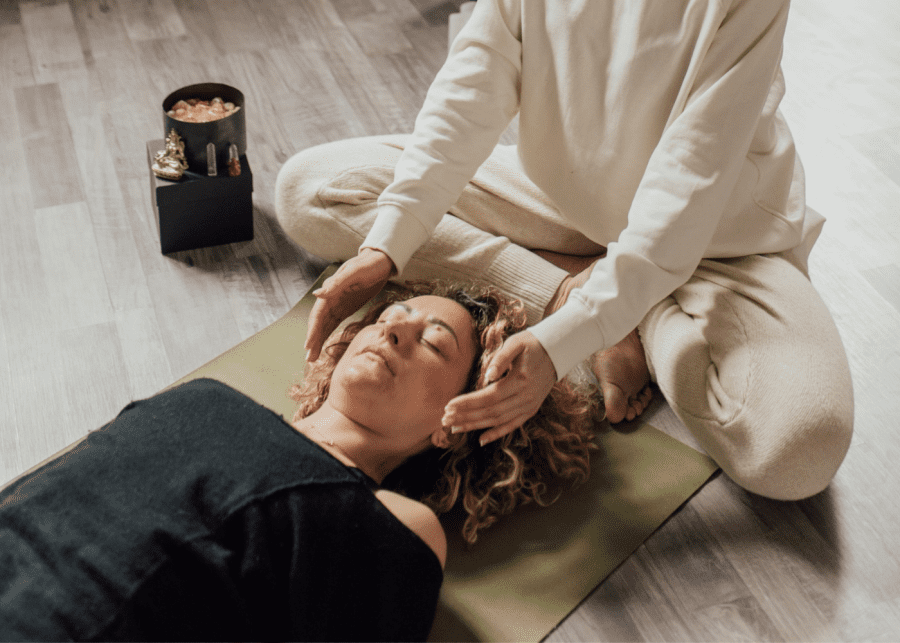
Got questions on psychic experiences? Want to know the meaning behind your dreams? Say hello to our spiritual guide and expert.
To understand our spiritual self, we need to ask questions. That’s how we initiate an inner enquiry that generates change, both within our inner terrain and our outer lives. We can only experience what we perceive, and perceptions are formed by seeking answers. As a spiritual mentor, healer and medium, Danielle Van de Velde fields questions ranging from dream interpretation and establishing a meditation practice, to energy healing and dynamics, to intuition and experiences with the spirit realm. Exploring spiritual enquiry is her jam!
Ask The Spirit Whisperer
I sometimes dream that different loved ones pass away and I wake up in tears. It feels so real and it’s scary. What does it mean?

Dear AA,
It sounds like you feel a deep bond of love with the people close to you. You also have a sensitive heart, which is rare and beautiful. However, if you’re dreaming of your loved ones passing and it’s invoking a fearful, upset response, it could be time to examine your perspectives on attachment and death.
The reality is that we exist in a temporal world – all things birth, flourish, dissolve and rebirth. The cycle of life is evident in nature, spiritual frameworks and world cultures. I wrote about my observations on the wonderful Mexican Day of the Dead rituals in my blog post A Date with Death. But in modern life and pop culture, we tend to avoid open discussion about the inevitability of death and strive for eternal youth instead. For many, ageing and death are loathed and feared rather than seen as beautiful natural cycles.
I have a personal experience of this. When I became a mum years ago, I learnt I had a huge attachment to staying alive for my children. This fed a strong, unconscious needy behaviour of control.
One day, I attended a Buddhist meditation called Last Day Contemplation. It’s a contemplative meditation where you listen to twelve statements of truth about the temporary nature of life. It acts as a diagnostic – to show you where your attachments lie – and medicine to free you from fear of the inevitable nature of life, which includes death. After repeated practice, it freed me from fear and established a new liberated way to live.
Contemplating death creates a sense of deep gratitude for life and a desire to be present for your loved ones and every experience of life. We’re all going to die, so why waste that beautiful heart of yours mourning your loved ones? Love them with all you’ve got, with gratitude for having them in your life now.
I’m distracted easily. Meditation doesn’t work for me. How can I channel my inner zen when I’m always restless? I have this need to keep myself busy to feel like I’m being productive, otherwise, I’m wasting time.

Dear S,
Distraction and constant restlessness are common symptoms of an overwrought nervous system. Rest and stillness of mind and body are essential for our well-being, creativity and intuitive living. I spoke about this for Creative Mornings a few years ago in The Art of Being Lost.
An alternative perspective is that cultivating periods of stillness is highly productive. It also increases your productivity as you’re more aligned with the resting and active cycles of your nervous system. With a better alignment to the natural requirements of your system, rather than overriding them with a false perspective about productivity, you change your relationship by becoming more present.
With regard to your meditation practice, it’s hard to move into deeper meditative states with an overwrought nervous system. Start with walking meditation and breathwork outside in nature. These combinations calm your nervous system, which allows movement into present awareness. This is when the body heals itself – your mind moves into necessary modes of integration and germination of new ideas and operating modes.
You can stream for free a large selection of my guided breathwork practices on the Insight Timer app.
Why do I dream about my partner cheating on me? Is it a sign or am I just being paranoid?

Dear X,
It’s helpful to regard your dreams as messages from your subconscious mind from you and about you. Here are some angles you might like to explore.
It’s possible that you’re unhappy with the sense of commitment and communication in your relationship. Cheating by its nature is hidden and untruthful. It doesn’t mean your partner is cheating or will cheat. But if it’s coming through your dreams, it’s an invitation to look at your relationship and be clear with your partner on the level of communication and behaviour you need to feel safe, desirable and committed.
It’s possibly messaging about you cheating on yourself. Are you engaging in activities and perspectives that aren’t aligned with your true nature, purpose and talents? Even though the dream is refracting through an image of a significant relationship, it’s the theme that’s important. Perhaps review where you’re at with friendships, work and family – and adjust to allow a truer and more passionate expression of yourself.
Is it possible you’ve been betrayed before? If so, a constant fear of it can lead to distrust or looking for cheating signs that aren’t there. This can vastly affect your ability to be intimate or trust your partner to take a deeper seat in your heart and life.
Journaling is great: list the behaviours that work and those that make you feel uneasy or insecure. Next, have the talk. Perhaps your partner doesn’t realise how you feel. A few simple changes to your communication and daily behaviours can take you both to a higher, solid ground of trust and intimacy.
I’ve always heard the advice to ‘trust your intuition’. But I don’t know when it’s my intuition talking or my anxiety. How can I learn to identify it?

Dear D,
It’s useful to examine your understanding of what ‘intuition’ is. Many hold a limited understanding that intuitive information only arrives in visions or revelatory thoughts. However, we have eight (currently defined) intuitive senses that deliver information through inner vision or thoughts, feelings in the body, emotions, inner words, tastes, smells, or a clear and undeniable knowing.
Intuitive information is much more subtle than our physical sensory information. It requires space within the psyche to perceive it. That’s why I encourage my psychic development students to cultivate a daily meditation practice as part of their development. Daily meditation creates a much expanded mental ‘space’ and a more palpable experience of changes in the energy body. While we’re all designed with the same senses (inner and outer), people generally have one or two more dominant intuitive senses.
For me, these are clairvoyance (psychic sight) and clairsentience (psychic feeling). I pay attention to intuitive information that comes through these senses or two or more of my other inner senses at any one time. I’ve found it offers more reliable information. Just like any skill, intuition must be developed to become reliable. The starting point is regular meditation, which is also proven to address symptoms of anxiety.
My mum left me a few years ago. I’ve dreamt of her. The dreams share a similar theme. I’m always trying to call her phone or wanting to find her to be with her. It’s late. Mum still isn’t back home. The dreams feel very real but mum isn’t dead.

Dear Jean,
As your mum is still alive, we can rule out mediumistic contact via your dreams, which is a common way for our loved ones who passed on to connect with us. Given this is a recurring dream, it points to unresolved emotions you feel towards your mum. It’s good to distil the themes in dreams for more clarity. For example, your mum is out of contact and unavailable. There’s a felt distance, as you’re calling on a phone. There’s a sense of time pressure or lost time – because in the dream it’s late at night.
It seems you’re still coming to terms with your mum’s departure from your life and you need closure or an explanation. If you’re in contact with her, it might be worth meeting for a conversation to better understand her reason for leaving, and for you to express your love and desire to have her in your life. If this isn’t possible, refocus from the ‘loss’ of your mum to the things you’ve gained from your time with her.
Journaling is wonderful for this. Make some time in a special place with your journal and use memory meditation to bring to mind happy memories, traits and characteristics of your mum that you love about her. Translate these into traits and characteristics you’ve inherited from her. This can also include lovely family customs and rituals.
If your earlier memories of your mum are fraught, writing ‘The Unsent Letter’ can be very useful in softening attachments to an unresolved past (find more information in my book Spirited). Create a sacred space and time to do this.
You write a letter ‘as if’ you’re really writing to your mum. Show your understanding that she needed to leave for her own reasons. Express clearly the effect her action had on you, and finish the letter with a statement of command – that her action will no longer affect you or govern your behaviours or dreams from this point on. You can hold on to the letter as a reminder of your own personal power or burn it in a ritual that symbolises you letting go and moving forward.
How do you know when dreams have meaning and when they’re just… dreams? How can I differentiate between the two?

Hi YY,
Our dreaming takes many forms. Freud deduced that nearly every dream has elements of unprocessed thoughts and emotions from the day. Both Freud and Jung produced beautiful studies on the symbolism and messaging of dreams as forms of communication, problem-solving and pure creative genius from the subconscious mind.
Some of the world’s most paradigm-shifting, progressive inventions were conceived in dreams – sometimes in their entirety. For example, Larry Page’s idea for Google, Tesla’s alternating current generator, Mendeleyev’s periodic table, and Watson’s double helix spiral form of DNA.
To tap the potential of your dreams, look at them in the context of your broader life. What are you pondering about? Do you have a challenge or quandary you’re seeking to solve? What are the dominant themes in your life and relationships? When you examine your dreams in this context, often you can find thematic guidance.
A dream journal, where you document your dreams straight after waking, can be hugely helpful in distilling the themes. There’s also the beautiful shamanic view – that our dream space is our healing space. The real-time action is happening within our dreams, whether or not our linear mind can make sense of them. Many shamanic practitioners pay attention to how differently you feel and act after dreaming, and are grateful for this fascinating aspect of consciousness.
This guy has been appearing in my dreams from time to time. We’re acquaintances from church, but the odd thing is, whenever I pray about meeting my future spouse, I’ll suddenly bump into him. A few years ago, I found out he’s attached. Coincidentally, we’re also now working in the same office building. And no, we haven’t spoken. What does it mean?

Dear Anon,
I’m a big believer in synchronicity. It appears this man is connected in some way with your desire to settle down. If you’re praying for a partner, your field of experience will be responding and showing you attributes in others that align with you and your intention.
It’s also possible that he’s noticing or thinking of you. When two people are thinking of each other, there’s a kind of energetic entanglement that gives rise to what we might call ‘coincidences’. It can mean there’s high compatibility, and perhaps it’s a matter of timing. Or there are aspects about this man you’re drawn to and desire in a partner.
Given that you have your church in common and now the workplace, why not say ‘hi’ and open up some conversation? You’ll get a much better feel for what’s going on if you connect. It might also be a good nudge to think more specifically about what you’d like in a partner – their character, values, and life dreams. When you’re clear on the kind of man you’d like to marry, the universe will respond clearly.
I was in an intense toxic relationship in my teens and into my 20s. I harbour a lot of guilt and shame about my part and actions during that time. Sometimes I dream I’m back under the control of my ex who fulfilled a need for care and protection. I’ve worked on accepting myself as I am today, but I don’t like thinking about or looking back and wish I could erase it. How can I move forward?

Dear S,
As we move through life to find ourselves, I don’t know a single person who hasn’t acted or spoken in ways they wish they hadn’t in their younger years. Our life journeys and relationships play an essential role in forming who we are, our strength of character and the choices we make going forward. This experience from your younger years has shown you the dynamics of toxicity, the harm we can create when behaving unconsciously, and your innate strengths and standard. These are highly valuable lessons.
The fact that you can look back and realise this isn’t the person you are today shows you how much you’ve grown. If there are people in your life from that time whom you might have hurt, it can be enormously liberating to share with them your realisation and ask for their forgiveness. If they’ve since moved on, the mantric meditation (and traditional Hawaiian practice) Ho’oponopono can be very liberating from guilt and remorse.
Enter meditation in a quiet place at a chosen time. Bring to mind each person you might be harbouring guilt about and speak the Ho’oponopono mantra to them psychically with all the feeling – as if you’re speaking with them directly. Include yourself in the meditation too.
“I’m sorry. Please forgive me. Thank you. I love you.”
You may need to make this a regular practice if the shame and guilt are intense – which they sound like they are. But you’ll start to feel them soften and dissolve. Stay present to ‘what is’ and cultivate gratitude too. This is a healing superpower. It’s a lot harder to walk your life path into possibility and wholeness when you’re looking back over your shoulder into the past.
Why are some people able to see or feel the presence of ghosts, but others are completely oblivious? Are we born this way or is it an ability that can be developed?

Dear L,
We’re all designed exactly the same way, with the same psychic senses and abilities. Whether a person is able to perceive spirits depends on a number of factors: how present and calm their psychic space is, if they grew up with an acceptance of the spirit realm, and how sensitive they are to energy.
I’m asking this question of all the experienced mediums I’m speaking with in this season of my podcast, The Modern Crone: Afterlife. Some were born with highly sensitive psychic senses into families of mediums and psychics. These perceptions were encouraged within their families of origin. For others, it was the loss of a loved one or a trauma that booted up their senses. As for those like me, who were already active in healing and psychic arts, mediumship emerged naturally as an extension of that work.
These finer, subtle senses can be cultivated. It takes dedicated practice and regular work with a good teacher and group. The starting point is regular meditation. This is key to witnessing information coming through the mind and subtle changes in energy.
I’ve seen amazingly accurate mediums who work happily for the spirit realm to bring their messages of love and guidance through. The one thing they all have in common is their dedication to developing the art; I do think some people are more minded about it.
When I asked my tutor the same question, her response was, “Absolutely, yes! Mediumship is a bit like learning to play the piano. Everyone can learn, but not everyone will be a Liberace.”
You might like to check out my psychic development circles. We gather in person and online fortnightly to engage in specific practices to sharpen the psychic senses. Spirits communicate via our psychic senses, so aside from regular meditation practice to clear inner space and gain mastery over your energy body, these are a great way to start.
I was with this guy for four years. He’s still hovering in my life. He comes from a traditional family; his mum wants to matchmake him with someone. He’s told his mum he wants to marry someone of his choice, and she’s agreed. However, five years later, there’s still no word of marriage. Should I continue to wait for him?

Dear NH,
Navigating family of origin and cultural customs can be tricky in relationships, especially with dominant maternal influences. Project your sights beyond the marriage proposal. Ask yourself if you’d be happy to spend the rest of your life with his mother playing a dominant role in your relationship, or creating a schism in his family dynamics any time you disagree with their opinions or desires.
If he’s told you he wants to marry you, yet hasn’t acted on it in five years, he’s clearly in conflict with the idea and you are disempowered. Maybe he doesn’t want to upset his parents, or he’s baulking at the responsibility of marriage.
The best move is to communicate with him clearly and honestly about how you feel. Ask him to respect you and tell you where he’s at. If he’s unable to do this, and you can’t formulate a plan to be together, you don’t have a solid foundation for marriage. Cultivate gratitude for the time you’ve had together and move on, sister! Life is too short.
How can I let my intuition guide me during times of confusion or stress?

Dear Sherawaye,
Our intuition signals to us all the time, even in confusion and stress. However, it’s in these times that our energy field is contracted and dense. It’s difficult to perceive guidance from our deeper aspect. The trick is to focus on raising your resonance, and your intuitive guidance will become more apparent to you.
Here are my top ways to do this (please ensure they work for you given your health and lifestyle):
- Choose a window of time, around two to four weeks, and keep your diet light. Cut down or stop eating meat, cut stimulants (like coffee and alcohol) and boost hydration. A light tummy releases energy otherwise diverted to digestion and metabolising, and raises your resonance.
- Daily intentional breathwork (pranayama) increases the amount of vital life force (prana) in your system which enables greater mental clarity, a calmer nervous system and higher resonance. You can find lots of guided breathwork tracks (including mine) on the InsightTimer app and Spotify.
- Cultivate ‘higher vibration’ emotions like gratitude, awe and wonder, and loving kindness. E-motions (energy in motion) can be cultivated through meditative visualisation, spontaneous acts of kindness and altruism, exposure to natural beauty, and intentionally looking for the good in events and in other people.
- Regular grounding creates even distribution of energy through your system and generates flow and mental clarity. There are lots of ways to ground the energy body: immersion in nature, physical movement, somatic practices (like yoga and tapping), diet (eating botanical foods that are grown on the Earth), grounding meditations (including listening to digital recordings of wild sounds like birdsong and ocean waves), and mudras (Adhi Mudra and Bhu Mudra are two of my favourites).
- Journaling is fantastic for witnessing the shifts you generate through the above activities. It also helps to clock spontaneous body sensations, your dreams and the synchronicities around you, which are all ways your intuition speaks to you.
I dreamed I was in a room sleeping on the floor. I know it isn’t mine. When I close my eyes I can conjure a figure that touches and kisses me. It disappears when I open my eyes. I’ve tried to conjure the figure to ensure I’m wrong. After several tries, it becomes harder to open my eyes in the dream.
I started to see hands whenever I conjured the figure. When I can sense or see limbs, my eyes have difficulty opening. I had to scream to break out from the figure – it was like the figure was keeping my eyes closed. My last resort was to open my phone while struggling to keep one eye open. Once my phone turned on, I woke up. Is there any meaning to this?

Dear A,
This dream is interesting for a few reasons! Aside from your rather sexy and determined dream lover, it sounds like a lucid dream, where you’re aware of your awareness during the dream state. This usually happens during REM sleep, where your brain is active and your heart rate and eye movements increase. About 55% of people have experienced lucid dreams in their lifetime.
To increase control, increase your meta-cognition whilst you’re awake. This involves reality testing, which trains your mind to recognise your own awareness. As it becomes a habit, you can induce awareness while dreaming.
Some ways to do this: stop regularly during the day and touch a solid object, check a clock, look in a mirror, or read text. With these habits formed, in a lucid dream, you’ll be able to perform them. If your hand moves through the object, or the clock spins in different directions, or the text is jumbled, you’ll realise you’re dreaming and can assume control. You naturally did this by opening your phone (which would be a well-honed reality test habit from repetition when you’re awake). Clever you!
Now, on to this persistent dream lover. As you tried to ‘conjure’ a sexual experience, this possibly points towards a desire for one in life. However, there are reservations about it, possibly due to a belief about losing control or becoming disempowered through intimacy. This can be formed from childhood observations of significant adults and their attitudes towards sexual intimacy, an unpleasant or traumatic formative sexual experience, or mental conditioning through consuming certain pornography.
Sex therapists can help you uncover these beliefs or fears and reprogram them for a healthier attitude towards sex and intimacy. So I suggest you do some introspection around your attitudes towards sex and sexual intimacy. Engage a great therapist who can help you explore your sexuality. After all, sex is much more fun when you’re awake, feeling empowered and mutually engaged.
Does energy healing really work? If so, how?

The short answer is yes! There are many different modalities of energy healing that hail from different traditions. However, they all operate on similar principles. These can be broken down into a few key understandings:
- All experiences at their simplest level are organised patterns of energy and information. That includes our bodies, thoughts, emotional state and more subtle aspects of our being like our energy field and our spirit.
- Our phenomenal universe, that is, our experienced reality, is an expression of these fields.
- Our systems are designed to be well and vital. They’re constantly striving for wellness; they are intelligent. So when we experience illness, mental disquiet or repeated ‘negative’ experiences in our lives, there’s a dissonant pattern or interference in our natural energy. Causes include trauma, limiting beliefs from our family of origin, accidents or karmic repercussions, just to name a few.
A good energy healer has the ability to identify the dissonant pattern. They can treat it by re-establishing natural connections and running greater frequencies of vital life force through interrupted circuits. In turn, that returns us to our natural state of wellness and vitality.
I’ve witnessed spontaneous physical, mental or energy corrections every week. Sometimes, if the interference is a long-held pattern, it requires energy work combined with introspection and adoption of certain meditation and energy practices. Many of my clients check in for energy maintenance, too. They may be well, yet they recognise the benefits of treating their energy body, just as they do their physical fitness and diet.
When choosing an energy healer, I suggest going with trusted referrals and checking that they are seasoned and well-established. When you engage in energy healing, you’re also engaging in the energy of the healer. The more you know about them, the more informed your choice will be.
I’ve had psychic experiences before. Is that normal? Can it be developed?

When I run my psychic development circles, I always start with the question, ‘Who has experienced psychic phenomenon?’ So far, I haven’t met anyone who hasn’t. Maybe you had that random thought of a person from your past, only to hear from them or news of them shortly afterwards. Or that dream you had where elements of it came to pass. Perhaps you experienced a strong sense that something was ‘off’ with a person, only to discover a lie or negative intention towards you. These are all common forms of psychic awareness.
Our psychic senses are the inner expression of our outer (or mundane) senses. We’re born with both. Vision and clairvoyance, hearing and clairaudience, touch and clairsentience, for example. I like to explain it through the lens of the yogic koshas.
The Tantras describe the human being as a five-layered and interconnected system that ranges through the physical, energetic, mental or emotional, and spiritual. Modern science can detect and measure (to different degrees) our bodies, thoughts, feelings and energetic emanations. This suggests that our physical presence, the one we apply most of our attention to, is only one-fifth of our entire system. Four-fifths of our being is invisible and can only be perceived psychically, but we’re designed to perceive and develop it all.
For most of us, our modern culture, education and family origins have our awareness entrained solely in the psychophysical. That is, the mind and body. Sadly, we’re denied the understanding and development of our finer aspects of the energetic and spiritual. Yet we participate in every aspect all the time.
The starting point to all psychic development is to carve out enough inner space and calm to perceive our finer aspects and the energy patterns that move through them. The best way to do this? Meditation.
I’ve tried meditation but I can’t settle my mind and I feel like a failure. What am I doing wrong?

It’s important to remember that establishing a meditation practice is very much like getting fit or replacing your diet with a healthy one. The benefits of meditation, just like exercise and a healthy diet, come with regular practice. With meditation, we see structural changes in the brain and body chemistry within around 21 days. They’re more predominant in people who commit to a short daily practice.
These changes in the brain, brainwave activity, reduction in stress responses (chemical and emotional), and increase in immune function and a general sense of wellbeing are measurable. They all enable deeper and more reliable experiences of meditation.
Here are some tips to help you get started:
- Do your meditation sit at the same time daily. Mornings are best: straight after you get out of bed, or after morning exercise. Using the same location and a repeated little ritual help to create an association between your psyche and the act of meditating. Eventually, your system will recognise the time, place, ritual, and scent cues, and ready itself to enter meditation.
- Meditation isn’t about emptying the mind of all thoughts, but rather drawing the mind to a single point of focus initially. With repeated practice, you can dwell in present awareness during your meditation sits and throughout your day.
- If you have a lot of mind chatter, start with breathwork practices. There are physiological connections between the way we breathe, the breath itself and the activity of the brain and nervous system. I prefer the yogic pranayama techniques as they work with these connections and the breath is a lovely resonant point to anchor your awareness.
- Keep your attitude light, curious and playful. It’s one of the most beautiful self-care habits you can master. It’ll lead you to well-being and deep insight into yourself and your life. A hard goal-oriented mindset can limit the experience. Make it beautiful and evocative. Soon, your meditation practice will draw you in and you’ll feel the amazing benefits.
Stay spirited!

